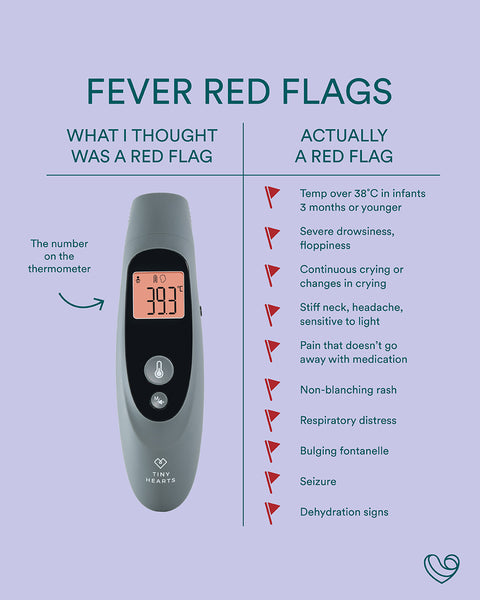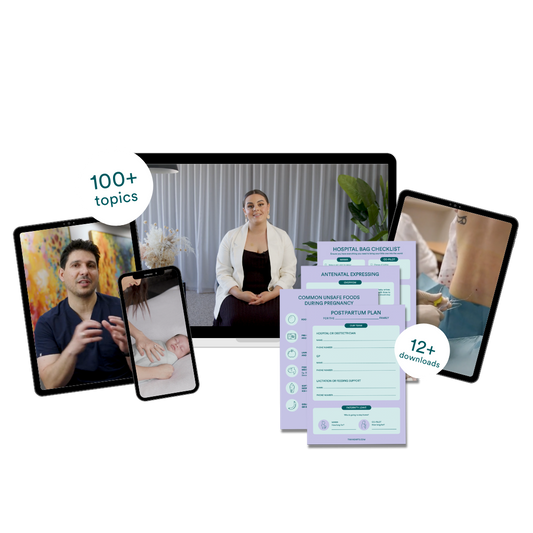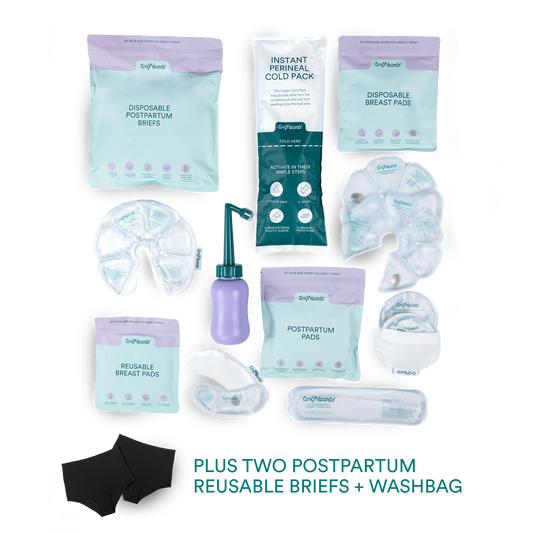As a parent, there is nothing worse than seeing our little ones struggle with sickness, and your bub's first cold will really pull your heartstrings! No matter how small the sniffle or sign of congestion, we feel for these little beings because we're primed to - and we love them with every inch of our souls. It can also be an anxious time for parents, so keep this guide close by to help you get through it as best you can.
What to expect
When we talk about a 'cold', we're actually referring to a viral upper respiratory tract infection [URTI]. There are hundreds of different viruses, so you may not know what specific viruses are causing the URTI, but some common ones you might hear of include respiratory syncytial virus [RSV], adenovirus, rhinovirus and enterovirus.
Common symptoms of a URTI include:
- Runny nose
- Cough
- Congestion
- Red, watery eyes
- Sore throat
- Sneezing
- Fever
If baby's symptoms are mild [and thankfully, most viruses in kiddies are], they can be managed at home using the strategies discussed below. However, The Royal Children's Hospital recommends that bubs under 3 months who are unwell with a URTI be assessed by a doctor as a precaution. That's because they can become unwell quickly.
FYI: Doctors won't give you antibiotics for little ones who are unwell with a virus because antibiotics don't work on viruses.
How to help
When you are feeling helpless and wishing there was something you could do for them, I'm here to remind you that there is. These tips below can help alleviate symptoms and empower you to nurse your little one through their cold at home:
Comfort is important
If your baby is miserable, you can give them paracetamol and/or ibuprofen to ease their discomfort. Always read the label before giving, and record it on your TH medication tracker to avoid overdose. Don't forget, bub must be six weeks or older to receive paracetamol and must be three months or older to receive ibuprofen.
Hydration is essential for recovery
Offer smaller, yet more frequent, feeds. A full belly can put pressure on the lungs, so when bub is sick, they will likely tolerate less volume of fluid at once but are offered more often! It doesn't matter so much about eating solid foods, but staying hydrated is so important. Don't forget to monitor hydration by keeping track of how much is going in and how much is going out. If your little one is not able to keep down fluids or has a decrease in the number of wet nappies they may be at risk of dehydration and you should bring them in for assessment.
Rest will help anyone feel at least a little better
Encourage sleep, quiet time and lots of snuggles. Don't be afraid to let go of routine and tune in to whatever your little person needs to heal.
The power of water is everything
If your little one is congested, taking them in the shower with you can help immensely. The skin-to-skin is a beautiful bonus that benefits all involved, and the steam from warm water may help with the congestion.
Saline drops or spray will help clear little noses
Do this as you need, particularly before a feed, to help bub breathe through their nose easier [see below for the recipe on how to make saline drops/ spray at home]

Cuddles, cuddles + more cuddles
Bub will need extra love when they cop their first cold.
Look after yourself too
It's normal to be anxious about bub's first cold; it happens to even the most seasoned parents. Not sleeping, not eating and not looking after yourself won't help bub, and it certainly won't help you make rational decisions based on a balanced assessment. Take care of yourself, too, so you can take care of your little love.
Honey, honey
There is some research to suggest that honey may reduce the severity and duration of a cough. Give your little love 1-2 teaspoons of honey taken 30 minutes before bedtime may be helpful for little ones aged over 1. Honey should be avoided in bubs under 1 due to the risk of Botulism.
Fluid-rich foods are your friend
When your little one is feeling unwell, it's common for them to refuse food or have a decrease in appetite. Don't stress if they're not eating as much because the most important thing is that they're drinking fluids to keep them hydrated. But if your little one does want to eat, offer fluid-rich foods to help pack in as much hydration as you can. Some good examples are watermelon, cucumber, peaches and tomato, as well as thickened fluids like yogurt, ice cream, soup and custard.
Treat the baby, not the number

If your bub has a fever but they're happy, you don't need to give them paracetamol and ibuprofen. But if they're miserable, you can treat them with these medications to help make them comfortable. Rather than being focused solely on bringing down the number, look at how they're coping and act accordingly. Reminder: this applies to little ones OVER 3 months only; bubs under three months who have a fever need medical attention.
Distraction
Distraction Bub's first cold is a good time to bring out their favourite toys, books and nursery rhymes. Quiet play is good too, and singing songs with them can help. If they're really miserable, don't forget that laying on the lounge and snuggling while watching The Wiggles on TV is ok too. Keep clean, regular hand washing, wiping down surfaces, not sharing cutlery, food or cups, and cleaning toys will help prevent the spread, particularly if there are multiple little ones in the house. In saying that, sometimes, no matter what you do, sickness will sweep your household.
Watch for red flags
Monitor bub closely for signs of deterioration, which we'll cover below.
When to seek medical attention
As with any time bub is sick, you need to monitor them closely for red flags. If bub has any of these red flags, they need to be medically assessed by a Doctor:
- Bub has a rash that doesn't fade when pressed on.
- They're showing signs of working hard to breathe or unusual breathing.
- Bub's skin is pale, blotchy or blue.
- High-pitched, weak or continuous crying
- Bub is drowsy or hard to wake up.
- Bub has a seizure.
- They're under three months and have a temp over 38 degrees.
- Reduced wet nappies
- Refusing to breastfeed or drink formula for bubs under 1, refusing to drink any fluids, including water for bubs over 1, or are unable to keep fluids down
- They've got a high fever that isn't improving after 48 hours.
- You're concerned
Saline Drops
Recipe
- Boil the kettle
- Mix 250ml of boiled water with 2 teaspoons of salt
- Allow the mixture to cool
- Pour the mix into a nasal spray bottle
- Demonstrate on yourself to test it works, then perform on bub
- Wipe away any draining mucous with a tissue
If you don't have a nasal spray bottle, you can use a small syringe and put 2-3 drops in bub's nare- one at a time. After doing this, bub may sneeze, which is expected. Some parents decide to take it one step further and use a nasal aspirator to draw out mucous to clear the airway. If you choose to do this, make sure you apply nasal spray first to soften up the mucous already present, suction gently and don't press the nasal aspirator in too deep as you can cause damage to the inside of the nose. Remember to clean the nasal aspirator thoroughly after each use.
What does the evidence say about using a nasal spray on a congested bubs?
Using a salty spray is considered a safe and effective practice. It can help reduce the need for other medications to treat any viral illness causing congestion, such as antihistamines, decongestants, antibiotics, and steroids. There are also no age limits on using saline drops.
Useful resources for parents
Here are some of our favourite resources to help you through times when your little one is sick. Bookmark and save these resources so you have them handy.
Victorian Virtual Emergency Department (VVED)
The VVED is a public health service for non-life-threatening emergencies by Northern Health. It is available to parents anywhere in Victoria, 24 hours a day, seven days a week. You will be linked to their Virtual Emergency Department waiting room and placed in a virtual triage queue. There are also interpreting services available.
Cubcare is a Brisbane based company that has various healthcare services to support families before, during and after their urgent healthcare needs. Some services offered by Cubcare include Urgent Care Clinic, Baby & Toddler Clinic, and Crying or Unsettled Baby. These services can be accessed for a fee. See their website for more details.
1300 MEDICINE (1300 633 424) 9am-5pm Mon-Fri
A service that can be used to answer medicine related questions such as side effects, how to take, and safe use in pregnancy and breastfeeding. It is a free service available to all Australians and is staffed by registered pharmacists.
MCHN Health Line
VIC: call 13 22 29 (24 hours a day, 7 days a week)
ACT: (02) 6287 3833, (9 am-4 pm Monday to Friday, except public holidays)
NSW: 1300 130 052 (9 am-9 pm Monday to Friday, 4 pm-9 pm weekends)
QLD+NT: 1300 301 300 (8 am-10 pm 7 days)
SA: 1300 364 100, (7.15 am-9.15 pm 7 days)
TAS: 1300 808 178, (24 hours 7 days)
This is a confidential health line that can provide information about the care and health of little ones from birth to school age. They can provide health information, health advice and family support.
An online tool parents can use to help g uide them to the appropriate healthcare action such as seeing a doctor, going to the emergency department. It can provide information on your symptoms and possible signs of illness, causes and complications.
Things to remember
- Most viruses are mild and will pass quickly.
- Everyone gets scared when their baby catches their first cold.
- No one will ever get mad at you for taking your bub to a Doctor if you think it's warranted.
- Your instinct is powerful, so if you're concerned this is more than a cold or they're not improving after a few days, advocate for your little one.
- You're doing a good job.
Share this blog with those who have little ones in their lives, and let me know, what did you do that helped your little one get through their first cold?









